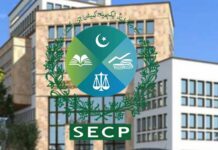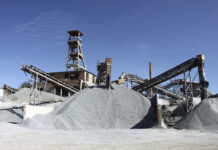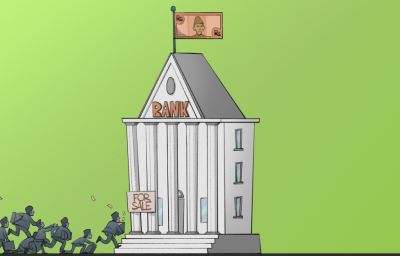For the first time in Pakistani history, three perfectly healthy and viable banks are simultaneously up for sale. None of them is a distressed asset being sold by sponsors who had hastily gotten into the banking business and made too many bad loans that they did not have the capital nor the stomach to be able to cover. And none of them is a bloated, nationalized bank filled with a balance sheet of politically motivated bad loans and an employee roster of people who want a paycheck for doing very little. No, these are all banks in rude health, and worthy targets of any financial institution that wants a strong beachhead on their way to conquering the Pakistani financial market.
The problem? Nobody who knows banking wants to buy them, and (most of) the people who want to buy them have little to no experience in banking.
The three banks up for sale are Bank Alfalah (BAFL), Meezan Bank (MEBL), and Faysal Bank (FABL), which are the sixth, eighth and thirteenth largest banks in the country respectively, as measured by total assets. All three are up for sale for more or less the same reasons: the Gulf Arab investors who initially put up the capital to create these banks have held their positions profitably for decades and are now looking for a suitable exit opportunity.
This is a unique moment in the financial history of the country. Ordinarily, when a bank in Pakistan goes up for sale, there is usually something terrible going on with it. Typically, banks in Pakistan get sold for three reasons:
1. The first reason is when the government is about to sell off a nationalised bank, with a bloated workforce and a balance sheet with more holes in it than a block of Swiss cheese. These tend to be large institutions with a wide branch network and recognisable brand names. Think Habib Bank, United Bank, etc.
2. The second reason is when a distressed local bank is put up for sale. Banks are not meant to be created like sausages, and unlike a cow, when you put together the worst bits of a country’s financial system, you do not suddenly get a high-flying financial institution, no matter how much you spend on branding and marketing it. (Yes, NIB Bank, we are talking about you.)
It is not always the result of a bad series of mergers, for example. Sometimes, the banks should never have existed and the sponsors should just have stuck with equities and never gotten involved with fixed income in the first place. (Yes, that would be you, KASB Bank.)
3. The third reason is when some foreign banks inevitably fail to implement their lack of a growth strategy for Pakistan and sell off their branch network to the institutions who are not in it for the quick buck. Some of these banks just get their timing wrong, like Barclays. Some suffer in other parts of the world and decide to scale back everywhere, including Pakistan, like Citibank. And some just professionally suck at life, like HSBC. (More on the general mass of incompetence that is HSBC later.)

None of these three situations apply to any of these banks. Meezan Bank is the fastest growing bank in Pakistan and has never had a single year of losses in its entire history. Bank Alfalah grew from almost nothing to become the sixth largest bank in the country and remains an exceptional bank when it comes to its focus on consumer lending. And Faysal Bank has relationships with most major corporations in Pakistan and has been a solid middle-market player.
So why are these institutions up for sale? Each has its own story, though those stories have a few elements in common. How closely those past trajectories will be a consideration for their prospective buyers is not yet known, though if they are prudent, the potential investors would do well to understand just how these banks got to be where they are today.
Bank Alfalah: the disruptor
Of the three, the biggest prize is Bank Alfalah, which in itself is a remarkable fact.
The list of the top five banks in Pakistan has consisted of the same names since 1959, with minimal movement in the rankings, until 2005, when Bank Alfalah, a bank that had at that point existed for only seven years in its current form, overtook Allied Bank to become the fifth largest in the country. While it has since then slipped back into sixth place, Bank Alfalah is the one bank that was not content to leave the Big Five in peace and has consistently had the ambition to grow into their ranks, possibly even break into the top three.
It is a bank that has ambition baked into its DNA, and its past CEOs, despite their very different management styles, have strived to somehow preserve that culture.

The story of Bank Alfalah starts with the Bank of Credit and Commerce International (BCCI) and its operations in Pakistan. The Bank of Credit and Commerce International was one of the most notoriously corrupt banks in the recent past of the global banking system and it started in Pakistan, founded by Agha Hasan Abedi, a man who got his start at Habib Bank in 1946, but then went on to create United Bank Ltd (UBL) in 1959, and the BCCI in 1972 after UBL got nationalised.
The BCCI started off from an office building on Karachi’s McLeod Road (in what is now Bank Alfalah headquarters) but quickly grew to become the seventh largest private bank in the world, along with it introducing an entire generation of Pakistanis to the world of international banking. The fraud that caused British regulators to shut down the bank in 1991 is, of course, now a well-documented part of banking history, but it did have a significant legitimate business that left orphaned assets in its wake after the bank was disbanded worldwide.
In Pakistan, its assets consisted of three branches in Karachi and Lahore. The State Bank of Pakistan took over those assets in 1992 and renamed them Habib Credit and Exchange.
The move to seize BCCI’s Pakistan assets coincided with the deregulation and privatization of the Pakistani banking sector. In 1997, Habib Credit and Exchange was bought out by a new banking entity backed by Middle Eastern investors: Bank Alfalah.
Bank Alfalah’s majority shareholder is Sheikh Nahyan bin Mubarak Al Nahyan, a member of the royal family of Abu Dhabi. His brother, Sheikh Hamdan, has been the chairman of BAFL’s board since 2002. Both brothers are minor members of the UAE federal cabinet. Incidentally, a different branch of the Nahyan family were the original investors in UBL, so Nahyan involvement in Pakistani banking goes back almost as far as there has been such a thing as Pakistani banking.
How Bank Alfalah grew from almost nothing to being one of the largest banks in Pakistan is a story in its own right, but suffice it to say that the bank is a powerhouse when it comes to consumer lending, in large part because its sponsors have always wanted it to focus on financing the growing middle class of Pakistan.
Sheikh Nahyan’s investments in Pakistan are housed under the Abu Dhabi Group – which has nothing to do with the sovereign wealth fund of the government of the UAE. Among the other assets they own in Pakistan are Wateen Telecom, an internet and communications infrastructure company, and Taavun, a real estate developer. The group sold its struggling mobile operator Warid to Jazz (then called Mobilink) in November 2015.
Given the struggles of its telecom businesses, it has long been rumoured that the Abu Dhabi Group may decide to close ship in Pakistan altogether and even sell off Bank Alfalah. In years past, however, the group’s majority shareholders have vociferously denied such rumours. Now, however, we at Profit can confirm from at least three sources in Pakistan’s financial services sector that the very earliest stages of a conversation about a sale of the Abu Dhabi Group’s shares in Bank Alfalah have begun.
It is this interest in selling off Bank Alfalah which is said to be behind Atif Bajwa’s departure as CEO of the bank in June 2017. Sources inside the bank say that he had been under tremendous pressure to reduce operating costs and had been unable to do so, in part due to his desire to protect the exceptionally strong benefits that the bank offers to its employees, matched in their generosity only by the state-owned National Bank of Pakistan.
It is not a coincidence that the man brought in to replace Bajwa was Nauman Ansari, the man who was responsible for unsentimentally removing an estimated Rs1.5 billion a year in excess operating costs from Faysal Bank’s income statement. Ansari served as CEO of Faysal Bank from 2014 through 2017.

In bringing in Ansari, the sponsors sent a clear signal – which the market cognoscenti received loud and clear – that the bank’s operations were being made more efficient and profitable in preparation for a sale. Higher profits are likely to result in a higher sale price for the Abu Dhabi Group’s shares in the bank.
However, it is likely to take Ansari at least two years to fully improve the economic efficiency of the bank’s operations, and it remains to be seen whether he will do so at the expense of alienating a highly talented workforce who were attracted to the bank for its generous benefits (Alfalah pays for the full medical costs of an employee’s parents, a benefit that can be crucial for many families).
And given the fact that this is far from a distressed sale, the Abu Dhabi Group is likely to take their time and wait for the right offer from the right buyer before closing a transaction, a process that could drag on for several years if need be. Whoever wants to buy Bank Alfalah had better want it badly enough to make a highly compelling offer.
Meezan Bank: the Islamic juggernaut
Bank Alfalah may be the largest bank up for sale, but Meezan Bank is the most valuable, as measured by its market capitalization, which is higher than that of Bank Alfalah. Indeed, Meezan Bank’s market capitalization (stock price multiplied by the total number of shares outstanding, or the total value of the company) is higher than all but six banks, the six being the Big Five banks and Standard Chartered Bank Pakistan.
How is Meezan Bank valued higher than the larger Bank Alfalah? Because it has consistently grown faster than any other bank in Pakistan for the last thirteen years in a row. Simply put, Meezan Bank is a deposit gathering juggernaut. It has the unquestionable first-mover advantage in the Islamic banking market, which is an important segment in a country where many people have religious objections to conventional banking. Given its strong brand name in the Islamic banking sector, Meezan Bank’s management are probably the only ones in all of Pakistani finance who absolutely do not worry about where they will be able to raise deposits from.
If anything, Meezan Bank has the opposite problem: a deposit base that is growing too fast for its management to be able to profitably deploy in loans. That task is made much harder by the fact that – unlike other banks – it cannot buy long-term government bonds.
The longest tenure on a Shariah-compliant government bond in Pakistan is three years, and its yields are typically lower than a conventional three-year bond. Conventional banks have responded to the historically low-interest rates in Pakistan by shovelling money into long-term government bonds, where they can earn a nice spread of several basis points above the one-year bond. Islamic banks, unfortunately, do not have that option, though Meezan has been working with the government to introduce a Shariah-compliant version of the 10-year bond.

In the meantime, however, Meezan is desperate to deploy its capital into corporate and commercial loans, and its existing and prospective client base know that, which is why they are able to bargain down for lower rates than they would pay on conventional loans. It cannot rely on the religiosity of CFOs and corporate treasurers for higher rates, because Meezan Bank appears to have already run through the list of companies that bank only with Islamic banks and now has to compete for the Shariah-agnostic business alongside conventional banks. BankIslami or Dubai Islamic do not keep Meezan CEO Irfan Siddiqui awake at night. Standard Chartered, Habib Metropolitan and Faysal Bank do.
Meezan Bank started its existence in 1997 as Al-Meezan Investment Bank, an institution with a limited licence to build up a corporate and investment banking franchise. At the time it started out, Al-Meezan Investment Bank was so small, and considered so insignificant, that it did not even have a full-time CEO. Irfan Siddiqui, the man who was given the job (and still has it) was serving as general manager (effectively COO) of Pak-Kuwait Investment Company (PKIC), a joint venture between the governments of Pakistan and Kuwait.
Siddiqui continued in both capacities until at least 2001, working with a 30-person team to build out what appears to have been at the time a vehicle for PKIC’s fixed income business. However, it appears that Siddiqui saw the potential in Al-Meezan when nobody else appears to have spotted at the time.

Siddiqui started off his career as a chartered accountant in 1979, but worked for a significant portion of his career either in the Middle East or for Middle Eastern entities. The list of his previous employers includes the Abu Dhabi Investment Authority, Abu Dhabi Investment Company, and the Kuwait Investment Authority. That exposure to the Persian Gulf Arab states appears to have given him both an appreciation for Islamic banking (Islamic finance originated in the GCC region) as well as a network of contacts that would later help him build up the business.
Soon after it was launched, Siddiqui used his old contacts to bring in several other investors into the bank including the Islamic Development Bank, the Saudi-Pak Industrial and Agricultural Investment Company (a joint venture between the governments of Pakistan and Saudi Arabia), Shamil Bank, a Bahraini bank owned by Dar al-Maal al-Islami (DMI) Trust (the sponsors of Faysal Bank), and the Kuwait Awqaf, a Kuwaiti state-owned endowment.
Meezan Bank’s current shareholding is now dominated by Noor Financial Investments Company, a publicly listed company in Kuwait that manages the wealth of several of that country’s richest families. Noor Financial owns 49% of the bank and has publicly made it known that its shares are up for sale. Most notably, in 2013, they tried to sell the bank to Habibullah Khan, the Karachi-based billionaire who owns Mega Conglomerate, a shipping and logistics conglomerate that has since branched out into real estate development and other industries as well.

That transaction, however, was blocked by the State Bank of Pakistan, in part because Habibullah Khan was using an offshore company to conduct the transaction.
Meezan Bank’s rapid growth makes it an attractive acquisition target, though the one risk it has is the fact that the founder CEO Irfan Siddiqui is unlikely to remain in the job for much longer, having served in it for what is effectively 21 years. That key man risk aside, however, Meezan Bank is unquestionably a strong beachhead for any institution looking to establish a foothold in Pakistan’s financial services sector.
Faysal Bank: the hidden Islamic play
Long known as one of the “also-rans” of the Pakistani middle market, Faysal Bank has finally begun to capitalize on the synergies from its initially botched 2010 acquisition of RBS Pakistan and will likely further enhance its growth prospects by converting from a conventional bank to an Islamic one.
Faysal Bank started off its existence in Pakistan in 1987 as the tiny branch operations of Faysal Islamic Bank, a Bahraini bank owned by Prince Mohammad bin Faisal al Saud, the son of the late King Faisal of Saudi Arabia.
Mohammad was the eldest son of the late king, born in 1937. Like his younger brothers, he finished high school at the prestigious Lawrenceville School in New Jersey. He then went to Swarthmore College in Pennsylvania but then transferred to Menlo College in Silicon Valley from where he graduated. He appears to have always had a keen interest in finance because he started his career in 1959 at the Saudi Arabian Monetary Agency.

In 1977, Mohammad bin Faisal left the government and began investing some of his own capital into a new bank being formed in Egypt: Faisal Islamic Bank. In 1981, he created the Dar al-Maal al-Islami Trust (The House of Islamic Finance) in Geneva. DMI began investing in setting up Islamic banks throughout the Muslim world, setting banks up in Egypt, Bahrain, Niger, and Pakistan.
DMI originally created two banks in Pakistan. The first was the branch operations of Faisal Islamic Bank (set up in 1987), and the second was the Faisal Islamic Investment Bank (set up in 1996). In 1995, the branches of Faysal Islamic Bank were incorporated locally in Pakistan as a conventional bank. In 2002, the Islamic investment bank was merged into the conventional bank and the whole entity lost all of its Shariah-compliant credentials. The decision to move to a purely conventional model seems to have been prompted by the management, rather than the shareholders. Mohammad sees himself as a global advocate of Islamic finance, so he was probably not happy with the decision, but he let it slide, at least for some time.
This shift also did not go over well with many of the bank’s depositors, and many voted with their feet. In 2001, the bank’s total deposits were Rs31.9 billion ($509 million). By the end of 2002, the year of the shift, they had dropped to Rs24 billion ($393 million), a decline of nearly 23% in just one year.
Nevertheless, the bank soldiered on and was able to recover the lost deposits within the next year (2003) and had more than doubled its initial deposit base within the next two years, by the end of 2005. The bank did this by relying on the deposits of several Arab-owned businesses in Pakistan. Its single biggest client was the Attock Group which – through its ownership of Pakistan Oilfields, Attock Refinery and Attock Petroleum – is the only non-state-owned conglomerate to operate in every segment of the oil supply chain in Pakistan. At one point, the Attock Group accounted for nearly a quarter of all deposits at Faysal Bank.
The mid-2000s were a turbulent time for the bank, in part because of its strategy to rely on an outsize presence in the capital markets of Pakistan by effectively using its deposit base as one large proprietary trading book. It also did not help that the bank’s head of investment banking was indicted in a court in New York on charges of insider trading.
All that changed after Naved A Khan, a former ABN Amro banker, was brought in by the board in March 2008 to clean house. Naved Khan made significant changes to management, effectively firing most people and bringing over a large team from ABN Amro. And in 2010, he completed the acquisition of RBS Pakistan, which had acquired his old employer’s Pakistan operations. Naved Khan was good in cleaning up management and restoring some of Faysal Bank’s credibility in the market with the RBS acquisition, but it was his successor Nauman Ansari who finally put the pieces together and made the acquisition work, in addition to cutting away much of the bank’s bloated workforce.
More critically, the bank appears to be investing in its growth strategy by converting more of its branches to Islamic banking (which typically has faster deposit growth) and increasing the size of its branch network (currently at 405 branches) by another 100 branches over the next five years.
Faysal Bank is the smallest of the three banks currently up for sale, but may well be a highly attractive option for a smaller, more nimble buyer looking for the right combination of assets and talent to grow their presence in Pakistan.
One source familiar with the matter, however, claimed that sponsors of Faysal Bank, like those of Bank Alfalah, are asking for an exorbitant price, suggesting that they might not be as committed to the sale process.
And now, a word about the acquirers…
So who exactly is in a position to buy these assets? And who would want to buy them? The list includes both foreign and domestic players. The potential foreign acquirers would be the most interesting ones, since they are likely to be large foreign financial institutions, extending their presence into the Pakistani market. The most interested potential acquirers, however, are the domestic players, only some of whom have a history of previously owning and operating financial institutions.

Engro Corporation: The wealthiest contender by far has to be the Engro Corporation. Having recently divested itself of stakes in several key subsidiaries – including the flagship Engro Fertilizers and the former rising star Engro Foods – Pakistan’s largest private sector conglomerate now has $700 million in cash on its balance sheet. The delay in deploying that cash towards profitable investments is rapidly becoming a $700 million itch, and the company’s chairman, billionaire Hussain Dawood, is reported to be quite eager to remedy the situation as quickly as possible.
The problem with Engro owning a bank is that the group has never really operated a non-industrial business before. Hussain Dawood’s other conglomerate – the Dawood Hercules Corporation – has in the past owned a securities brokerage firm that dabbled in investment banking (Elixir Securities), and currently owns an alternative asset management company (Cyan Ltd), but retail and commercial banking is another beast entirely. Add to that Dawood’s reported aversion to “political exposure” in his future businesses, and a bank may not directly be a good fit for neither Engro nor the Dawood Hercules Corporation.
Nonetheless, there are only so many places one can deploy $700 million in Pakistan profitably. Engro could either find several investments and deploy the cash piecemeal, or it could buy a bank in one fell swoop. The temptation to do the latter is likely to be strong, even if the analysis suggests it may not be the most prudent move.
Mega Conglomerate: The shipping conglomerate owned by Habibullah Khan has by now quite publicly declared its intentions to buy a bank. In 2013, Habibullah Khan tried to buy Meezan Bank, a transaction that was ultimately blocked by the State Bank of Pakistan (more on State Bank’s lopsided policies below). And in an interview with Profit, he has admitted to wanting to buy a bank with a large branch network, specifically mentioning 600 branches as his benchmark. In effect, he all but said openly that he wants to buy Bank Alfalah. Should the Mega Conglomerate eventually be able to secure State Bank approval, the transaction would make a certain amount of sense from both Habibullah Khan’s perspective, as well as the broader economy.
For one thing, Habibullah Khan is currently the largest shareholder in Pioneer Cement and has made a bid for Dewan Cement. Should that transaction become successful, he will own companies with a cement producing capacity unrivalled in Pakistan. He has also had a recent spate of highly successful commercial real estate developments, and is on the verge of branching off towards luxury residential real estate as well as hotel management.
Should the Mega Group decide to advance further into real estate, owning a cement company as a supplier, and a bank that could lend a hand with financing (there are legal limits on self-dealing with banks, but owning one never hurts in raising capital) could potentially create synergies.
Yunus Brothers Group: Better known as the conglomerate that owns Lucky Cement, the Yunus Brothers Group and its majority shareholder Muhammad Ali Tabba have also reportedly expressed an interest in buying a bank, specifically Faysal Bank. Like Engro, however, Tabba has never owned a major non-industrial business before, and it is not immediately clear what advantage the group would gain from buying a bank.
In addition to Lucky Cement, the group owns ICI Pakistan, the chemical manufacturer, as well as Lucky Electric Power Company, an electricity generation company, as well as investments in cement manufacturing companies outside Pakistan. The group is a voracious user of growth capital, though that is not always a good enough reason to buy a bank.

At least one source familiar with the matter states that the Yunus Brothers Group may not be interested in directly acquiring a bank, but instead may provide capital to another investor interested in owning one. The other investor most likely to be backed by the Yunus Brothers Group is Adira Capital.
Adira Capital: The new kid on the block, Adira Capital is a company founded in 2017 but run by some very well-known names in Corporate Pakistan. It is primarily the brainchild of two seasoned executives: Waqar Malik, former CEO of ICI Pakistan, and Atif Bokhari, former CEO of United Bank Ltd. The company bills itself as a financial sponsor that is akin to a private equity firm, but instead of several funds with limited life spans, it has a pool of permanent capital that it deploys on behalf of some of the wealthiest Pakistani families. It made a splash in late 2017 by announcing its success in acquiring a controlling stake in Linde Pakistan, a provider of industrial gases.
While Adira is not yet an established player in the country’s corporate landscape, a bank acquisition by the group may make sense. After all, Atif Bokhari successfully ran the third largest bank in the country for 10 years, and is highly respected in Pakistan’s financial services sector as an able bank CEO. And despite its relatively recent provenance, Adira has shown itself capable of raising large enough sums of capital to outbid some of the most well-known names in Pakistan, as it did when it bought Linde Pakistan (now called Pakistan Oxygen).
In short, Adira Capital is a name to watch and potentially a serious contender in the game of bank acquisitions.
IGI Holdings: Syed Babar Ali is best known as the founder of the Lahore University of Management Sciences and Packages Ltd, but one of his other successful businesses is a series of financial institutions that operate under the brand name IGI. These include a general insurance company, a life insurance company, an asset management company, and an investment bank. So, despite his fame as an industrialist, Babar Ali actually has significant experience in financial services, albeit on the non-banking side of the capital market.
Several sources have repeatedly indicated that Babar Ali and his family are interested in buying a retail bank, and perhaps the most serious and credible evidence for that desire came last month, when they consolidated both insurance companies, the asset management firm, and the investment bank under a single holding company named IGI Holdings Ltd was Consolidating all financial entities under one roof looks a lot like the precursor to making a bid for a commercial bank to become a universal financial services institution. A source confirmed to Profit that ex-CEO Bank Alfalah, Atif Bajwa, was in the market on behalf of Babar Ali to gather investors and buy one of the banks up for sale.
The State Bank problem
All of these local bidders, however, have one big problem in common: the State Bank of Pakistan, which must approve any transaction involving large controlling shareholdings in any bank in the country. And on that front, aside from the idiosyncrasies of any individual acquirer, the one problem all of them will face is the fact that all three banks are currently owned by foreign entities, and thus any payment made to them will likely involve the Pakistani acquirer drawing down the country’s dollar reserves by selling rupees and buying US dollars in the currency market and then sending that cash abroad to the sellers’ home country (in this case, UAE, Kuwait, and Saudi Arabia respectively).
And that, apparently, is something that the State Bank of Pakistan is opposed to.
In the federal government’s asinine bid to control the exchange rate, and the constant fear of low foreign currency reserves, some potential acquirers say that the government may give them hard time when they seek to close the transaction, and may find excuses to delay or even block any transaction that would have a significant impact on the country’s foreign exchange reserves.
Sources familiar with the matter say that the State Bank is likely to ask any acquirer of these banks to either raise the money to pay the sellers from outside Pakistan, and then make the payment without any money ever traversing through the Pakistani banking system at all (and thus not impacting the country’s foreign exchange reserves), or if the money must leave Pakistan, that it do so in small installments paid out over an extended period of time.
Both of those conditions are unlikely to work, the first being difficult if not outright impossible for the buyers, and the second being unacceptable to the sellers.
Such concerns on the part of the State Bank are tantamount to introducing currency controls and effectively rescinding the right of foreign investors to repatriate their profits outside Pakistan. When asked to comment on the matter, a spokesperson for the central bank declined to comment on the matter, saying, they would only do so when they have official confirmation that a bank is being sold. “The SBP does not comment on hypothesis and assumption,” he said.
That non-denial denial aside, however, buying a foreign-owned bank for a domestic investor is likely to be made difficult by the State Bank. That might leave the potential foreign investors as somewhat stronger contenders, should they choose to exhibit a greater interest in Pakistani banking.
The foreign contenders
The Big Four American banks:
None of these is ever likely to be interested in acquiring a Pakistani bank. Citibank already has a presence in Pakistan and has never shown any interest in pulling a Standard Chartered and acquiring a local bank to enhance its footprint. JPMorgan Chase for a long time owned a seat on the Karachi Stock Exchange, which was eventually sold in 2012, and has a miniscule presence in Karachi to serve its international treasury clients’ need for Pakistani rupee transactions, but has otherwise indicated no interest in Pakistan whatsoever.
Bank of America, or at least some of its predecessor entities, has historically had branches in Pakistan, but has not had a presence in the country in decades, and judging by its current trajectory, is not interested in a global expansion spree, least of all in Pakistan. And Wells Fargo is unaware that a world exists outside the border of the United States.
The big European banks:
Among the largest European banks, most have either already tried and failed at having a presence in Pakistan, or else have indicated no interest in the country whatsoever.
Among the British banks, Barclays and HSBC have already tried and failed at having a presence in Pakistan (HSBC multiple times; more on them below) Lloyds Bank has shown no recent interest in Pakistan, which is a shame, since one of the most iconic buildings on McLeod Road in Karachi is the old Lloyds Bank building, which until very recently served as the headquarter of Silkbank.
Of the largest banks in France, both Credit Agricole and Societe Generale have had branches in Pakistan that were sold off in the early years of the Musharraf Administration, with Credit Agricole Indosuez Pakistan being bought by the institution that eventually became NIB Bank, and Societe Generale selling its Pakistan branches to Meezan Bank in 2003.
The only German bank to have shown an interest in Pakistan is Deutsche Bank and they seem perfectly comfortable having their three tiny branches in Karachi, Lahore, and Islamabad to serve their global German clients. And judging by how much trouble the German banks are in currently, none of them are likely to want to start expanding abroad.
EFG Hermes: Widely known as the Goldman Sachs of the Middle East and North Africa, EFG Hermes is a quintessentially capital markets institution. It has in the past, however, shown an interest in acquiring a commercial bank in Pakistan, and was one of the final two bidders for RBS Pakistan. However, it is unlikely that EFG Hermes will actually end up bidding for any of the banks up for sale, in part because EFG Hermes now already has a presence in Pakistan’s capital markets after having acquired Invest and Finance Securities in 2017.
EFG’s experience with commercial banking has not been a happy one historically. The bank had acquired a stake in Lebanon’s Banque Audi in January 2006, but then sold it in January 2010 after it became evident that the bank’s majority shareholders would never sell additional shares or allow EFG to gain management control.
Nonetheless, that transaction did signal a willingness on the part of an otherwise high flying capital markets institution to consider the more humble world of commercial banking as part of its growth strategy. It may well be possible that the attractiveness of the assets on sale in Pakistan right now may tempted EFG Hermes to try its luck in commercial banking once again.
HSBC: If HSBC ever applies to come back to the Pakistani banking market, it should be laughed out of the offices of the State Bank of Pakistan. We include HSBC on this list not because we think it has a serious chance or intention of buying any of the three banks, but to tell you just how bad a failure HSBC has been in Pakistan and why it does not deserve to ever come back to the country.
HSBC has by far the worst track record in Pakistan of any foreign bank, which is saying something considering the fact that the list includes Barclays’ decision to enter Pakistan in late 2008, and ABN Amro’s decision to buy Prime Bank in 2007. No, when it comes to bad timing and a spectacular inconsistency of strategy, HSBC are a class on their own.

The bank has entered the Pakistan market three times, and left in disgrace all three times. It first came in 1982, and had left by 1986. It returned again for a time in the early 1990s and again in the late 1990s, finally putting up its business for sale in 2012, a transaction that ultimately closed with Meezan Bank putting the old British bank out of its misery in Pakistan.
The transaction closed in 2013 and HSBC left Pakistan for the third, and quite possible the last, time. To that, we say good riddance.
ICBC and Bank of China: Both the Industrial and Commercial Bank of China and the Bank of China – the largest and second largest banks in China respectively – have been consistently rumoured as possibly being interested in buying a bank in Pakistan. ICBC may have lent slightly more credibility to those rumours by actually opening up branches in Pakistan and plastering its name on top of the tallest building in Karachi.
However, sources familiar with the matter say that the rumours are more often than not wishful thinking on the part of Pakistani investment bankers hoping to sell assets to cash-rich buyers from China. There has been little indication on the part of either bank that it wants to expand its business in Pakistan and neither of them has even so much as put in a request for an initial due diligence in any of the many auctions of Pakistani banks that have taken place over the last decade.
Given the increased economic cooperation between Pakistan and China, and given other Chinese financial institutions’ interest in Pakistan (think the Shanghai Stock Exchange buying the Karachi Stock Exchange), one might expect it to be a natural fit for Chinese banks to acquire Pakistani banks. Alas, like most things CPEC, we fear this is likely to be a mirage as well.
Işbank: The sentimental favourite among the foreign banks absolutely has to be Turkey’s Işbank. Işbank is the largest bank in Turkey and currently has absolutely no presence in Pakistan. But its history ties the bank back to this part of the world, and its existence is one of the reasons why the people of Turkey have a soft spot for the people of Pakistan.

In 1919, shortly after the end of the First World War, Maulana Mohammad Ali Jauhar and Maulana Shaukat Ali Jauhar started a movement to save the Ottoman caliphate in Turkey from being dismembered by the victorious European powers following the Treaty of Versailles and the Treaty of Sevres. Most Pakistani high school students know this story: Indian Muslim volunteers from what is now Pakistan, as well as other parts of India, went to fight in Turkey against invading European armies in a war that defined the very existence of modern Turkey. And several families donated heavily, with some women giving away the entirety of their jewelry, to help finance the Turkish war effort. The Turks have never forgotten that help and that is why Turkey has a historically strong diplomatic bond with Pakistan.
The part of the story that is less well known is what happened with the money that was left over from the donations of South Asian Muslims after Turkey won the war. That money was used by the government of modern Turkey’s founder, Mustafa Kemal, to fund a national bank, which was named Işbank. The bank has been an integral part of Turkey’s economic growth story since the very beginning of its republic.
Işbank has been looking for a way to enter the Pakistani market for some time now. In 2012, it considered a bid for HSBC Bank’s Pakistan operations. However, according to sources familiar with the bank’s thinking at the time, the bank withdrew its bid because it wanted to acquire a bigger bank in Pakistan to establish a real presence throughout the country, not just a small foothold.
It would be history coming full circle if Işbank ended up acquiring one of these banks, and the money that left this part of the world almost a century ago finally came home.
























Bhai, in short words btao banks for sale hn kia? Wanna switch from these banks?
Kudos…
Well researched and even better, authored.
Presumptions are fact based and not wishful thinking…
The article, may just broaden the ” also-intetested,” to take notice and sit up…
There just has to be a follow up article to this. .in due course.
Very well written article.
This is very informative, thanks for the article. But it is mentioned here after Turkey won the war ” are you serious” ?
Agree
The war referred to here is the Greco-Turkish war (1919-1922) which is widely regarded as having ended in a decisive victory by Turkey.
interesting to read
Very informative articles.
Very informative article about the history of all these banks here in Pakistan.
You are also spot on about the blunders committed by European banks in Pakistan’s market. From HSBC’s botched attempts at banking in Pakistan to Barclays ill timed decision to enter. But to me, ABN-AMRO’s decision to purchase Prime Bank easily takes the cake as ABN was working very successfully in Pakistan since over 50 years. Just one purchase (albeit at a spectacularly huge cost), and the Bank had to shut down its operations in Pakistan.
Ironically, while ABN AMRO Pakistan was hit by the mini typhoon called ‘Prime’, at the same time in 2008, the world got hit by the Tsunami of ‘Sub Prime’.
simply wow
Amazing analysis. It was such a pleasure reading it.
Farooq, very comprehensive but seems you have a personal issue with HSBC which is probably the only sore point of your otherwise well researched and written document. Yes, perhaps HSBC never really understood Pakistan and hence never became what Citi once was or what SCB still is. However, HSBC never exited or reentered the market between 1982 and 2013. It retrenched it’s operations a few times and all due to external events but those were never full exits, till the one in 2013.
Excellent article yet simple enough to capture the interest of even non-relevant people. I hope some relevant entities take benefit out of this research.
Very informative indeed.
Well written
Illuminatis IN and Illuminatis OUT!
Farooq Tirmizi must commend you on a very well written article. Read it end to end. I think it’s the first financial article I’ve read in ages in which I didn’t skip lines or simply forgot the topic. Wanted to congratulate you on this! Look forward to more!
Same here.
[…] By way of Profit […]
[…] By way of Profit […]
[…] Via Profit […]
Excellent article!
Very informative, interesting and well researched article.
Very Comprehensive with detailed analytical views of strong three banks presence in the country are operating with commendable profit results.
Good taste article. Redefined reading….
wonderful piece….well researched and very well written….lots of information for a non banker like me….keep up the good work.
A well written piece. The irony of Pakistani Market is that once the company or the product matures, parent company wants to get out of it. That is not the case with India where foreign investment has been in place since decades.
All in all, SBP is expected to give hard time if Sale proceeds from these banks make their way out of the country.
An excellent read. Very well researched.
Well researched write, but looks like some personal issues with BCCI.
Informative. Very lengthy but worth the time.
Comments are closed.